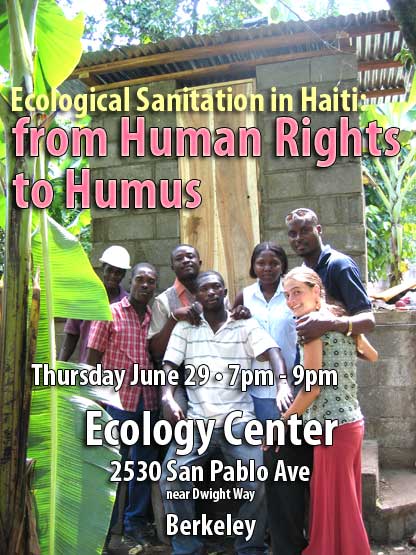|
Ecological Sanitation in Haiti: from Human Rights to Humus
June 28, 2006
|
News
HaitiAction.net
|
||||
 |
 |
 |
 |
 |
 |
 Ecological Sanitation in Haiti: from Human Rights to Humus
Ecological Sanitation in Haiti: from Human Rights to Humus
Come hear a talk about the intersection of ecology and human rights in Haiti
Time: 7pm - 9pm
Location: Ecology Center
2530 San Pablo Ave, near Dwight Way, Berkeley.
Cost:Free
Info: 510-548-2220 x233, erc@ecologycenter.org
Thursday June 29,
Sasha Kramer talk about the work of Sustainable Organic Integrated Livelihoods (SOIL), a new Bay Area non-profit which seeks to support and participate in community efforts to enhance soil fertility, protect water resources, improve crop yields and create livelihood opportunities in Haiti. She will specifically be discussing the ecological and social aspects of a new composting toilet project that is currently underway in northern Haiti.
Members of SOL in front of first public composting toilet in Milot built June 2006
What do composting toilets mean for health, nutrition and the environment?
Approximately 2.6 billion people around the world do not currently have access to sanitation facilities, resulting in high incidences of waterborne disease and environmental degradation.
Ecological sanitation is a relatively new approach to this problem which promotes low cost methods for recycling nutrients from human wastes for use in agriculture. This approach has been widely adopted in regions of southern Africa where it has had important implications for public health, nutrition, and the environment.
Inspired by the work in Africa, this summer Sasha and SOIL will be working with a group of Stanford engineers from Engineers for a Sustainable World to set up several demonstration ecological sanitation sites in rural Haiti. These groups will be working in collaboration with SOL (Sosyete Oganize pou Lanati), a new Haitian group that will coordinate the project locally. Come hear about this important work.
About the Speaker:
Sasha Kramer received her PhD in 2005 from the ecology program at Stanford. For the past several years she has worked in rural Haiti as a human rights observer and traveled to Africa several times to learn about ecological approaches to rural sanitation. She is currently working to start the non-profit SOIL (Sustainable Organic Integrated Livelihoods) to support research and implementation of community based approaches to soil fertility (beginning with ecological sanitation) in Haiti.
There are no toilets in the community of Shada in Cap Haitien Haiti.
Junior Duncan in Malawi demonstrating how he uses his composting kiddie-loo.